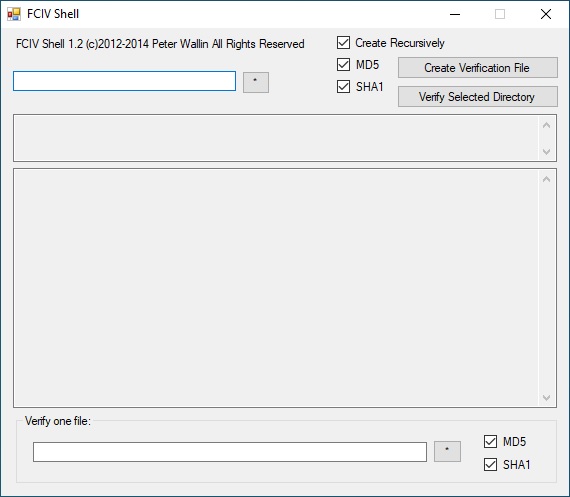Remote-Control.Net
FCIVShell - File Verification Tool with Source Code
FCIVShell - File Verification Tool with Source Code
FCIVShell (C)2012-2014 Peter Wallin -- File Verification Tool
Source-code included
For small backup jobs, use FCIVShell as part of your file backup workflow. It won't make your backups, but it can help verify that they are good years later when you need to do a restore. The word "backup" may intimitate people, but it can be as simple as copying your favorite photos, tax forms, and other electronic documents that you made to some USB-drives, a couple external hard-drives and to cloud storage space. As you get more favorite files, you will likely need to organize them in nicely named subfolders. Always assume that any machine or online service can break tomorrow, so make many copies of your favorite files today. Don't wait until "tomorrow" to make your backups. Try to use encryption for financial and private files or find someone who can help you with this.
With FCIVShell you will be able to find out if your backups are still good years later or if they are a victim of bit-rot [wikipedia.org] which can happen over time. To reduce the risk of bit-rot, make new backups on various types of media (DVDs, hard-drives, USB-drives, cloud-storage, etc) every two or three years and use file verification software as part of this process. Don't discard old backup media. Keep some copies at the home of a friend or family member and/or at a bank safe deposit box.
FCIVShell is used with fciv.exe and is for making it easier for creating fciv.xml files that contain MD5 and/or SHA1 hash codes for files. One fciv.xml file will be placed in the top level folder that is being scanned. This XML/text file will include hash-codes for all files that are found in the folder that you direct it to.
FCIVShell will work with files that are up to about 7 GB in size. If you need to get the hash-code for a file larger than 7 GB, you can use the "Verify one file" feature of the program which will work for that large file. You can copy the hash-code results into a manually created text file called md5sha1.txt and save that file next to your big file.
FCIVShell is the one program I made that I install in every Windows PC or virtual machine that I build.
Download Part 1:
fciv.exe is unsupported software by Microsoft(R) which can still be acquired at:
http://support.microsoft.com/kb/841290
Download Part 2:
FCIVShell.zip - 25KB - Includes FCIVShell.exe and its C# source code
(Optional) This product is currently not digitally signed. After downloading, if you are using Windows 7 or higher, and you downloaded the software from www.remote-control.net, right-click on the ZIP file on your computer, select "Properties" and click the [Unblock] button.
Setup:
Copy FCIVShell.exe and fciv.exe to the same folder on your computer.
One possible place is: "C:\Program Files" if you are installing as Administrator.
Next, right-click FCIVShell.exe and select "Copy" then right-click on your desktop and select "Paste shortcut" to put a short-cut on your desktop for easy access.
Try running the program. If it complains about .Net 4 not being installed, you can get that installation package from: .Net 4.0 Runtime
